| Listing 1 - 10 of 19 | << page >> |
Sort by
|
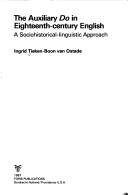
ISBN: 906765339X Year: 1987 Publisher: Dordrecht
Abstract | Keywords | Export | Availability | Bookmark
 Loading...
Loading...Choose an application
- Reference Manager
- EndNote
- RefWorks (Direct export to RefWorks)
Historical linguistics --- English language --- Grammar --- Sociolinguistics --- anno 1700-1799 --- 802.0-024 --- Modern Engels--(vanaf 16de eeuw) --- Theses --- 802.0-024 Modern Engels--(vanaf 16de eeuw)
Book
ISBN: 3825310728 Year: 2001 Volume: *2 Publisher: Heidelberg Universitätsverlag Winter
Abstract | Keywords | Export | Availability | Bookmark
 Loading...
Loading...Choose an application
- Reference Manager
- EndNote
- RefWorks (Direct export to RefWorks)
English language --- Sociolinguistics --- anno 1700-1799 --- 802.0-024 --- Modern Engels--(vanaf 16de eeuw) --- 802.0-024 Modern Engels--(vanaf 16de eeuw) --- 18th century --- History
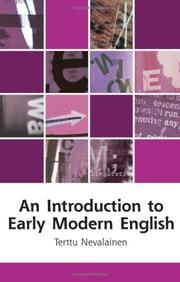
ISBN: 0748615245 0748615237 1280501413 0748626360 9780748626366 9786610501410 6610501416 9781280501418 Year: 2022 Volume: *1 Publisher: Edinburgh
Abstract | Keywords | Export | Availability | Bookmark
 Loading...
Loading...Choose an application
- Reference Manager
- EndNote
- RefWorks (Direct export to RefWorks)
An introduction to Early Modern English, this book helps students of English and linguistics to place the language of the period 1500-1700 in its historical context as a language with a common core; but also as one which varies across time, regionally and socially, and according to register.
802.0-024 --- 802.0-024 Modern Engels--(vanaf 16de eeuw) --- Modern Engels--(vanaf 16de eeuw) --- English language --- Early modern, 1500-1700 --- Germanic languages --- Grammar.
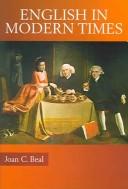
ISBN: 0203784456 128266705X 9786612667053 1444119133 9781444119138 0340761172 9780340761175 9780203784457 6612667052 9781134664092 9781134664160 9781138144064 1138144061 1134664095 Year: 2004 Publisher: London : New York : Arnold ; Distributed in the U.S.A. by Oxford University Press,
Abstract | Keywords | Export | Availability | Bookmark
 Loading...
Loading...Choose an application
- Reference Manager
- EndNote
- RefWorks (Direct export to RefWorks)
English in Modern Times describes the development of the English language from 1700 until 1945, and argues that it is in the course of this later modern English period that the characteristics of 'modern' English evolved.
English language --- History. --- Grammar, Historical. --- Standardization. --- 802.0-024 --- 802.0-024 Modern Engels--(vanaf 16de eeuw) --- Modern Engels--(vanaf 16de eeuw) --- Grammar, Historical --- History --- Standardization --- Germanic languages
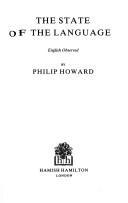
ISBN: 0241113466 9780241113462 Year: 1984 Publisher: London Hamilton
Abstract | Keywords | Export | Availability | Bookmark
 Loading...
Loading...Choose an application
- Reference Manager
- EndNote
- RefWorks (Direct export to RefWorks)
English language --- Anglais (Langue) --- Variation --- 802.0-024 --- -Germanic languages --- Modern Engels--(vanaf 16de eeuw) --- -Modern Engels--(vanaf 16de eeuw) --- 802.0-024 Modern Engels--(vanaf 16de eeuw) --- -802.0-024 Modern Engels--(vanaf 16de eeuw) --- Germanic languages --- Dialects --- English language - Variation
Multi
ISBN: 9519416293 9789519416298 Year: 1991 Volume: 50 Publisher: Société néophilologique de Helsinki,
Abstract | Keywords | Export | Availability | Bookmark
 Loading...
Loading...Choose an application
- Reference Manager
- EndNote
- RefWorks (Direct export to RefWorks)
802.0-024 --- Modern Engels--(vanaf 16de eeuw) --- 802.0-024 Modern Engels--(vanaf 16de eeuw) --- English language --- Early modern, 1500-1700 --- Noun phrase --- More, Thomas --- Language --- Anglais (langue) --- 1500-1700 (moderne) --- Grammaire
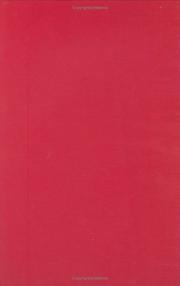
ISBN: 904201735X 9004333088 9789042017351 Year: 2005 Volume: 54 Publisher: Amsterdam: Rodopi,
Abstract | Keywords | Export | Availability | Bookmark
 Loading...
Loading...Choose an application
- Reference Manager
- EndNote
- RefWorks (Direct export to RefWorks)
The present volume is an empirical, corpus-based study of the progressive in 19th-century English. As the 1800s have been relatively neglected in previous research, and as the study is based on a new cross-genre corpus focusing on this period (CONCE = A Corpus of Nineteenth-Century English), the volume adds significantly to our knowledge of the historical development of the progressive. The use of two separate measures enables an accurate account of the frequency development of the progressive, which is also related to multi-feature/multi-dimensional analyses. Other topics covered include the complexity of progressive verb phrases and the distribution of the construction across linguistic parameters such as clause type. Special attention is paid to progressives that express something beyond purely aspectual meaning. The results show that the progressive became more fully integrated into English grammar over the 19th century, but also that linguistic and extralinguistic parameters affected this integration process; for instance, the construction was more common in women’s than in men’s private letters. Owing to the wide methodological scope of the study, it is of interest to linguists specializing in corpus linguistics, language variation and change, verbal syntax, the progressive, or the linguistic expression of aspect, either in synchrony or diachrony.
Book
ISBN: 9780511781643 9780521887649 9781107686090 9780511932441 0511932448 0511781644 052188764X 1107686091 0511852290 1107211662 1282918664 9786612918667 0511931107 0511927266 0511924720 0511929765 Year: 2010 Publisher: Cambridge, UK New York Cambridge University Press
Abstract | Keywords | Export | Availability | Bookmark
 Loading...
Loading...Choose an application
- Reference Manager
- EndNote
- RefWorks (Direct export to RefWorks)
The eighteenth century was a key period in the development of the English language, in which the modern standard emerged and many dictionaries and grammars first appeared. This book is divided into thematic sections which deal with issues central to English in the eighteenth century. These include linguistic ideology and the grammatical tradition, the contribution of women to the writing of grammars, the interactions of writers at this time and how politeness was encoded in language, including that on a regional level. The contributions also discuss how language was seen and discussed in public and how grammarians, lexicographers, journalists, pamphleteers and publishers judged on-going change. The novel insights offered in this book extend our knowledge of the English language at the onset of the modern period.
802.0-024 --- 802.0-024 Modern Engels--(vanaf 16de eeuw) --- Modern Engels--(vanaf 16de eeuw) --- English language --- English philology --- Germanic philology --- Germanic languages --- Rhetoric. --- Usage. --- History. --- Arts and Humanities --- Language & Linguistics
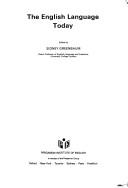
ISBN: 0080310788 9780080310787 Year: 1985 Publisher: Oxford: Pergamon,
Abstract | Keywords | Export | Availability | Bookmark
 Loading...
Loading...Choose an application
- Reference Manager
- EndNote
- RefWorks (Direct export to RefWorks)
English language --- Anglais (Langue) --- Anglais (Langue) à l'étranger --- History --- Histoire --- 802.0-024 --- -English language --- -Germanic languages --- Modern Engels--(vanaf 16de eeuw) --- English language. --- History. --- -Modern Engels--(vanaf 16de eeuw) --- 802.0-024 Modern Engels--(vanaf 16de eeuw) --- -802.0-024 Modern Engels--(vanaf 16de eeuw) --- Anglais (Langue) à l'étranger --- Germanic languages --- English language in foreign countries --- World Englishes --- Foreign countries --- English language - History --- English language - Foreign countries
Book
ISBN: 9519603050 9789519603056 Year: 1991 Volume: 51 Publisher: Helsinki : Société néophilologique,
Abstract | Keywords | Export | Availability | Bookmark
 Loading...
Loading...Choose an application
- Reference Manager
- EndNote
- RefWorks (Direct export to RefWorks)
English language --- Adverb. --- Grammar, Historical. --- 802.0-024 --- 802.0-56 --- -English language --- -Germanic languages --- Modern Engels--(vanaf 16de eeuw) --- Engels: syntaxis; semantiek --- Adverb --- Grammar, Historical --- -Modern Engels--(vanaf 16de eeuw) --- 802.0-56 Engels: syntaxis; semantiek --- 802.0-024 Modern Engels--(vanaf 16de eeuw) --- -802.0-56 Engels: syntaxis; semantiek --- Germanic languages --- English language - Adverb. --- English language - Early modern, 1500-1700 - Adverb. --- English language - Grammar, Historical. --- Anglais (langue) --- Adverbes --- Adverbe
| Listing 1 - 10 of 19 | << page >> |
Sort by
|

 Search
Search Feedback
Feedback About UniCat
About UniCat  Help
Help News
News